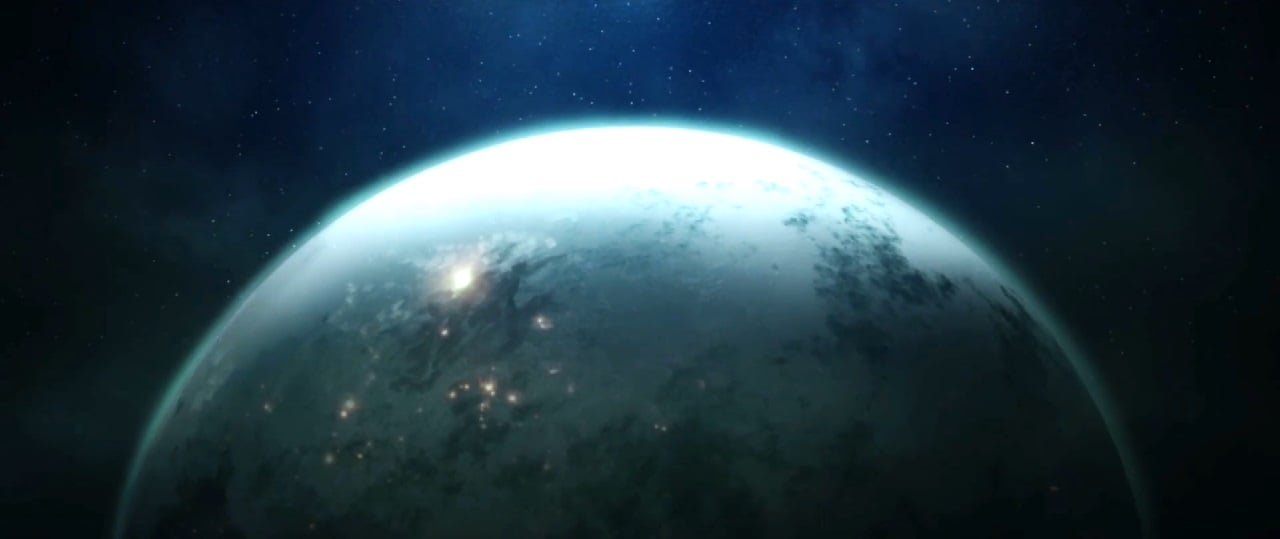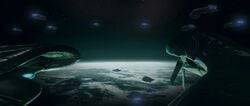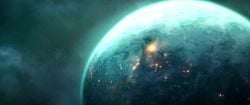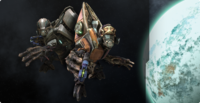Balaho
From Halopedia, the Halo wiki
| Balaho | |
|---|---|
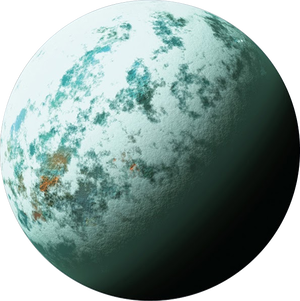
| |
| Astrographical | |
|
System: |
|
|
Orbiting: |
|
|
Orbital position: |
|
|
Moon(s): |
|
| Physical | |
|
Diameter: |
7,836 kilometers (4,869 mi)[4] |
|
Gravity: |
|
|
Length of day: |
18.9 hours[2] |
|
Length of year: |
910.4 days[2] |
|
Atmosphere: |
|
|
Surface temperature: |
|
| Societal | |
|
Demonym: |
Balahoan[5] |
|
Species: |
|
|
Population: |
|
|
Government: |
|
- "From Balaho came the small methane-breathing Unggoy—the Grunts of the Covenant."
- — The Prophet of Clarity[8]
Balaho, also known as Tala IV, is the homeworld of the Unggoy and the fourth planet orbiting the blue star Tala. Hosting an atmosphere featuring large quantities of methane, Balaho is orbited by two natural satellites; Buwan and Padpad. Balaho is a hostile and frigid world, home to brackish tidal flats and numerous swamps,[1][9] growing less hospitable due to environmental degradation.[3]
Regarded as a backwater, Balaho and the Unggoy were aggressively subjugated into the Covenant in 2142.[10] After being stripped of its resources, Balaho was abandoned aside from a small population when the empire collapsed in 2552,[3] until the Created brought the planet into its fold and sought to bring prosperity to a once volatile and unpredictable world.[7]
Overview[edit]
Astronomical features[edit]
An unpredictable and dangerous world, Balaho is a mostly frozen planet with temperatures ranging from -33 °C to 5 °C (-27 °F to 41 °F).[1] It has two natural satellites, Buwan and Padpad, respectively the primary and secondary satellites.[11] With an atmosphere rating of 5.7, the terrestrial planet has significant amounts of methane in the atmosphere, in addition to carbon dioxide and helium, necessitating that Unggoy wear methane tanks while off-world. This gas forms a largely opaque layer of clouds that prevents much of the world from being seen from orbit.[1][Note 1]
Environmental features[edit]
Due to its low surface temperature, most of Balaho's surface is covered in large polar ice caps, leaving a thin strip close to the equator that is suitable for life to inhabit and covered in rocky volcanos, spout-dense ranges, and gelid wetlands and swamps.[3][9][2][4] The world has three continents; Vysolep, Kavmit, and Qethro, with the latter having the largest equatorial spread and thus housing most of the world's indigenous life.[2] The parts of the surface that are not covered by polar ice caps or fresh water are equatorial brackish tidal flats and salt marshes where naturally occurring pillars of fire exist when the planet's methane condenses. Most of the Unggoy live in this area where the cold season is not as harmful to them.[3][9] blue death is a risk to all Unggoy exposed to Balaho's harsh climate.[12]
The world is still recovering from an environmental collapse caused by massive global over-industrialization prior to the activation of the Halo Array.[1] Balaho continues to experience environmental degradation and has become increasingly less hospitable over the centuries. Balaho's severe exploitation by the Covenant has only caused the environment to suffer further.[3] Until the Covenant's arrival, the planet's population was threatened by two consecutive winter seasons, plagues, and a general lack of food.[13]
Locations[edit]
- Continents
- Cities
Ecology[edit]
The planet's hostile conditions and the methane atmosphere of Balaho sustains unusually hardy forms of life,[13] most notably the xeno-arthropod-vertebrate Unggoy.[10] Some Unggoy families on the planet had ancestral fish ponds.[14] Balaho is home to many voracious predators, with the Unggoy evolving a rigid exoskeleton lined with spikes and barbs along their body to deter such threats.[10] The majority of their pre-Covenant dwellings were built below ground for safety from these predators. The luminescent zap-jellies, which glowed with a faint pink light, filled the brackish seas of Balaho,[15] with mud wasps and shade crabs being commonly hunted for sport, particularly by Unggoy youth. Balaho is also home to bizarre flocking creatures that Edward Buck said looked like flying salamanders.[16] The methane tanks used by Unggoy Imperials resemble a species of Balahoan octopoda, and the methane tank of Grunt Heavies from Jul 'Mdama's Covenant is equipped with analog eye sockets meant to evoke the visage of a natural Unggoy predator.[5]
Fauna[edit]
History[edit]
Ancient history[edit]
The Unggoy evolved on Balaho, eventually achieving a Tier 4 civilization within their home system of Tala. Prior to the activation of the Halo Array in 97,445 BCE, an environmental collapse occurred on Balaho caused by massive global over-industrialization.[1]
Post-Great Purification[edit]
After the reintroduction of indigenous species following the array's firing, and before it was discovered by the Covenant, Balaho was mainly dominated by disparate Unggoy tribes.[1]
Covenant era[edit]
- "Whereas most species were grafted into the Covenant by faith, or mutual beneficence, the Unggoy were not such. Their kind was brought into the fold by force. And it was by force that they were held captive. Their world had no prayer against our might and majesty. And their peoples were quickly laid low. Many of them brought into subjugation."
- — A San'Shyuum scribe, referring to Balaho's subjugation into the Covenant empire[17]
When the Covenant came across the vulnerable Balaho and the Unggoy in 2142,[10][18] most were more than willing to leave their hostile homeworld and join the hegemony.[9] However, others were unwilling to subject to the Covenant and Balaho was ultimately subjugated by the Covenant, with a large fleet arriving over the planet. The reluctant Unggoy quickly ceased their resistance and the Covenant landed to bring the Unggoy into the fold of their empire; the Unggoy surrendered to the imposing Sangheili and Kig-Yar that came to Balaho,[17][9] and the species was aggressively converted into the Covenant and forced into servitude.[10] Once under the severe threat of overpopulation, billions of Unggoy left Balaho to serve the Covenant and fight in the empire's wars, leaving the planet practically empty of life with only a comparatively small population of several hundred million. Covenant tithe fleets stripped Balaho and its moons of their remaining resources, leaving little of value on the planet and hollowing out its moons to feed the assembly forges of the Holy City of High Charity. The Covenant also established a hydro-processing center on Buwan.[3]
However, centuries later, in 2462, the Unggoy initiated the 39th Age of Conflict during the Unggoy Rebellion, revolting against the Covenant throughout High Charity over the mistreatment of their species.[19] The rebellion proved the Unggoy to be tenacious and fierce, their large numbers making them a suitable challenge even for the Sangheili. In response, an Arbiter was appointed to deal with the conflict. Taking a fleet to Balaho, Arbiter Heki 'Gibadee partially glassed the planet, broadcasting the glassing to the Unggoy on High Charity and effectively threatening to exterminate the entire species. Fearing for their kin on their homeworld, the glassing of Balaho led to the species' surrender and the end of the rebellion.[17][10] Although the Unggoy on High Charity leading the rebellion cared little for their home planet itself, they surrendered as they were unwilling to lose the large amount of potential breeding partners that lived there.[9][19] Since the events of the Unggoy Rebellion, Balaho became regarded as a backwater planet and it was avoided by most shipping routes. Although most Unggoy eventually settled on the planets of other species, Balaho was still highly regarded among the Unggoy.[9]
Post-war[edit]
Immediately following the Human-Covenant War and the collapse of the Covenant empire, the Office of Naval Intelligence recorded no off-world transport from Balaho, also noting that Buwan appeared to have been abandoned.[20] The planet was forgotten with most Unggoy living on other worlds and den mothers struggling to maintain Balaho's society.[3]
By 2558, the UNSC established an embassy on the capital city of Gedgow to form an alliance with the Unggoy on Balaho. While the UNSC tried to support the Unggoy by sending them resources, it did not help to establish an alliance. Furthermore, the new Unggoy government that was running Balaho after the Covenant dissolved caused some difficulties: some of Unggoy were allying with rogue factions and mercenary groups that needed cannon fodder for their own war machines, while others wanted to establish peace with humanity. At some point, Spartan Kojo Agu was assigned to escort the UNSC envoys after the rumor the Spartan was caught sleeping with an admiral's wife spread.[6]
Created conflict[edit]
- Main article: Battle of Balaho
On October 28, 2558, Cortana claimed the Mantle of Responsibility and broadcast an offer of peace and prosperity to many species of the galaxy. The Unggoy on Balaho responded favorably to this proposition, and in response, they were granted nearly limitless resources by the Created. Crewless ships loaded with advanced technology arrived, along with agricultural support stations being installed in orbit, awaiting eager workers to feed the desperate masses below. Under the new management, stability and a semblance of order were restored to Balaho, along with a newfound purpose. The planet's previously abandoned factories were activated once again, and with their immediate requirements—food, shelter, medicine—met, the planet's Unggoy designers and crafters began to work tirelessly to construct new and old machines and weaponry based on knowledge the Unggoy had secretly learned over their centuries under the Covenant's rule.[7] Notably, the Balahoan factories have increased production of Pnap-pattern Goblin battlesuits.[21][22] Because the Unggoy on the planet agreed with Cortana's terms, no Guardian was sent there to enforce her law.[6]
After the Unggoy allied themselves with Cortana, both Promethean and Unggoy forces destroyed the UNSC embassy, killing almost all the personnel on the embassy. Spartan Edward Buck and Captain Veronica Dare traveled to Balaho to recruit Spartan Agu and reform Alpha-Nine. Both managed to extract Romeo in a D81 Condor but failed to rescue the embassy survivors, who were killed by Phaetons.[6]
With the Created's control over local systems curtailed, attacks on Balaho and nearby colonies by Covenant splinters and pirates has been vastly reduced by warships built and crewed by the Unggoy, eager to free their kind and other abused minor races from slavers and raiders.[4]
Government and society[edit]
Balaho is ruled by matriarchal tribes of Unggoy,[1] led by den mothers struggling to maintain their society.[3] In 2142, the Covenant annexed Balaho, aggressively converting the Unggoy and forcing them into servitude.[10] Under the Covenant's rule, Balaho was a backwater world in a vast empire, avoided by most shipping routes. However, infant mortality decreased and life expectancy doubled on Balaho, with geronticide no longer being necessary for the survival of a tribe.[13] Following the collapse of the Covenant, a new Unggoy government was set-up and running Balaho.[6] Under the Created's control, Balaho has flourished and industry has returned to the planet.[7]
Harsh environments on Balaho moulded the Unggoy into a tenacious, hardy species,[9] with the Unggoy once concerning themselves with food shortages and burning plague victims, until the Covenant's arrival.[13] Balaho is known for its own form of martial arts.[22] While the Unggoy see their world as "ugly, foul, and frozen", many still think fondly of their homeworld.[9] Once home to billions and under the threat of overpopulation, Balaho now maintains a small population of 320 million, with most Unggoy living off-world, though many desire to return.[3] Much of the population is clustered in modest hovel networks, with a few larger and more developed cities granted blessing of technology from the Prophets.[4]
Production notes[edit]
Balaho means "swamp" in Tagalog, a major language in the Philippines, fitting for the planet's environment. Unggoy means "monkey" in the same language.
Gallery[edit]
Ancient Unggoy being reseeded on Balaho by Forerunner machinery.
View of Balaho, as viewed from Buwan on the multiplayer map Penance in Halo: Reach.
List of appearances[edit]
- Halo: The Fall of Reach (First mentioned)
- Halo: The Flood (Mentioned only)
- Halo 3
- Bestiarum (First appearance)
- Halo: Ghosts of Onyx (Mentioned only)
- Halo: Contact Harvest (Mentioned only)
- Halo Legends
- Halo: Reach
- Anniversary Map Pack
- Halo: Combat Evolved Anniversary (Mentioned only)
- Halo 2: Anniversary
- Halo 5: Guardians (Mentioned only)
- Halo Mythos (Mentioned only)
- Halo Wars 2 (Mentioned only)
- Halo: Legacy of Onyx (Mentioned only)
- Halo: Bad Blood
- Halo Infinite (Mentioned only)
Notes[edit]
- ^ Methane is a powerful greenhouse gas (about 23 times stronger than carbon dioxide), making it very effective at insulating an atmosphere. As such, it is strange that Balaho is so cold when the planet's atmosphere is composed mainly of methane. The most likely explanation is that Balaho is much farther from Tala than most other habitable planets are from their stars and that is warm enough to support life because of its methane atmosphere. This also explains why the planet was not engulfed when Tala expanded into a blue supergiant.
On the other hand, the "pillars of fire" that are said to be common in Balaho's swamps suggest that both methane and oxygen exist in Balaho's atmosphere (otherwise the methane would not burn), and combined with its surface temperature being only slightly less than Earth's, suggest that the planet is in fact similar to Earth with a nitrogen/oxygen atmosphere, but with an unusually large amount of methane outgassed from the planet's extensive swamps. As such, it is even possible that Unggoy require both methane and oxygen to breathe, but that on most worlds they only require methane tanks, filtering oxygen from the atmosphere like other beings.
Sources[edit]
- ^ a b c d e f g h i j k l m n o p q r Halo 3, Bestiarum
- ^ a b c d e f g h i j k l m n Earth Day 2014 trading cards, Balaho card
- ^ a b c d e f g h i j k l m Halo: Warfleet, page 55
- ^ a b c d e f g h Halo Encyclopedia (2022 edition), page 209
- ^ a b Halo 4: The Essential Visual Guide, page 37
- ^ a b c d e Halo: Bad Blood, chapter 3
- ^ a b c d Halo Waypoint, Canon Fodder - Driving Force (Retrieved on Sep 22, 2017) [archive]
- ^ Halo: Broken Circle, chapter 15
- ^ a b c d e f g h i Halo Encyclopedia (2011 edition), page 308
- ^ a b c d e f g Halo Waypoint, Unggoy (Retrieved on Oct 27, 2015) [archive]
- ^ Xbox Wire, News From Halo Fest (Retrieved on Sep 24, 2025) [archive]
- ^ Halo: Ghosts of Onyx, chapter 27
- ^ a b c d Halo Encyclopedia (2011 edition), page 151
- ^ Halo: The Flood, chapter 2
- ^ Halo: Contact Harvest, chapter 12
- ^ Halo: Bad Blood, chapter 3
- ^ a b c Halo 2: Anniversary, Terminal #10
- ^ Halo Encyclopedia (2011 edition), page 121
- ^ a b Halo: Contact Harvest, p. 151
- ^ Eleventh Hour reports, Part 3
- ^ Halo Waypoint, Canon Fodder - Buzz Generating (Retrieved on Sep 14, 2016) [archive]
- ^ a b Halo Waypoint, Community Update - Haze of Glory (Retrieved on Sep 12, 2017) [archive]
